DIRECTED AND WRITTEN BY KIM HYŏNSŏK
DISTRIBUTED BY STARMAX/MYUNG FILM
DVD, 104 MINUTES, 2003
ENGLISH SUBTITLES*
Reviewed by Jina E. Kim
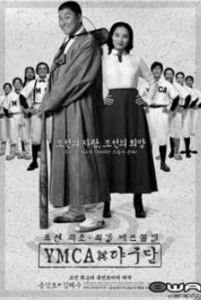
Although much that is written about Korean popular culture has revolved around Korean television drama, pop music, and film, a less explored arena is the relationship between sports and popular culture and history and popular culture. The film YMCA Baseball Team, a historical drama, presents the arrival of baseball in Korea in 1905 by showing how Koreans encountered and learned to play this new sport. Humor and physical comedy are used to highlight the ways in which Koreans learned about the new game, and how they eventually came to make it their own. At the same time, the film explores a more complex historical topic of Japanese colonialism and nationalism through baseball. One of the most valuable lessons that could be organized around this film is that contemporary popular culture is not just about “today” but about the past, and about how the past is still part of contemporary popular culture.
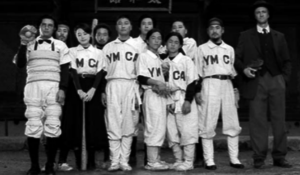
International sports venues such as the Olympics, World Cup Soccer, and the World Baseball Classic, are sites of intense display of national pride as well as cross cultural understanding. Kim Hyŏnsŏk’s 2002 historical drama/comedy about Korea’s first baseball team, which was founded just as Japan became Korea’s protectorate (1905), weaves both elements into the film narrative and presents a more nuanced look at a period in Korean history that is still taut with tension and controversy.
The director probably did not intend to be prophetic when this 2002 film was released, in light of what subsequently happened at the 2009 World Baseball Classic finals when Japan prevailed over South Korea, thereby capturing their second victory since the founding of this international competition in 2006. Rather on Kim’s mind, as well as others involved in the filmmaking and the general South Korean population, was the 2002 World Cup Soccer co-hosted by Korea and Japan in the months of May and June when excitement for the Korean team’s historical semi-final losing performance reverberated with cheers of fans chanting “Taehan minguk” (South Korea) throughout the entire country. While the successes of the 2002 World Cup were embraced by both South Korea and Japan, the territorial dispute over Tokdo/Takashima Island between the two countries loomed large, escalating nationalist sentiments and evoking memories of their century-long hostile relationship.
The underlying story in YMCA Baseball Team reflects the two countries’ colonial relationship. A parallel can be drawn, for example, between the Japanese occupation of the Korean peninsula and the Japanese soldiers’ takeover of the team’s YMCA baseball playing field. Also, when the team manager consoles the Korean players for their initial loss against the Japanese baseball team by saying that Japan began playing baseball thirty years before Korea, it helps relate Japan’s earlier modernization to Korea’s later efforts at modernization under colonial rule. Moreover, the film ends on a high note with the Korean YMCA team’s dramatic final inning win against the Japanese team on their rematch.
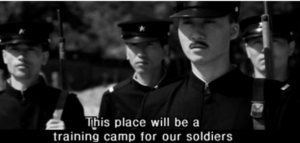
Screen capture from the film. © 2003 Myung Films Co. Ltd.
Yet what makes YMCA Baseball Team an uncharacteristically “nationalist” film, or an anti-Japanese film, is that it goes beyond offering just polemics. Perhaps most significantly, this film shows a Korea that is undergoing cultural, social, and political transition at the turn of the century. Baseball is poignantly used as a conduit for these transitions. This kind of complexity is embodied through the characters (in particular the young YMCA baseball team members) who are witnessing and negotiating these various transitions.
The youths in the film struggle with the changing times. Each grapples with their newly created position in society. Yi Hoch’ang (Song Kangho), the main character, is athletically gifted, but since physical activity for a scholar (sŏnbi) was discouraged, he must sort out his love for baseball versus his obligation to carry on the family tradition of becoming a Confucian scholar teaching children at a private Confucian academy (sŏdang). Min Jungrim (Kim Hyesu), Oh Daehyŏn (Kim Junhyŏk), Ryu Kwangt’ae (Hwang Jŏngmin), and Nomura Hideo (Suzuki Kazuma) must contend with their competing interests and obligations. Jungrim, who represents the New Woman (sin yŏsŏng), serves as a bridge between West and East, new and old, men and women. Daehyŏn questions his anti-colonial intellectual position against his friendship with a Japanese collaborator’s son. Kwangt’ae must choose between his allegiance to the Korean baseball team and the familial ties that bind him to his father, a Japanese collaborator. Hideo must carefully negotiate around his position as a young Japanese soldier who at times must play unfair, but finds baseball to exemplify ideals of sportsmanship.
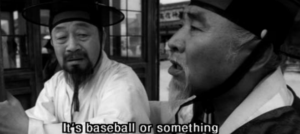
Screen capture from the film. © 2003 Myung Films Co. Ltd.
The film does an excellent job exposing both the adherence to and the breakdown of social classes that governed the social structure throughout the long Chosŏn dynasty, with the yangban (the aristocrat/literati/official) on the top, the chungin (farmers and merchants) in the middle, and the paekchŏng (servants, slaves, and entertainers) who are from the lowest social class ranks. With a potpourri of characters from all walks of life as members of the team, the film effectively considers the obstacles of restructuring the Chosŏn social class system while depicting the potential for change. Although the Kabo Reforms (1895) legally banned the traditional privileges of the yangban and abolished slavery, among other things, the actual practices of these reforms were much more gradual. YMCA Baseball Team addresses, and at times even humorously critiques, the difficulties of social transformation.
Some of the best examples can be found in the scenes where a former servant, now a merchant, initially shows deference to the son of his former master, while the arrogant, young master refuses to catch the balls thrown to him by this former servant during practice asking, “How can a nobleman catch a ball thrown by a lowborn?” The young yangban refuses to use the former servant’s bat, even though he has become a master craftsman and makes the best baseball bats for the team. Comically presented as these scenes may be, Kim Hyŏnsŏk voices a harsh criticism of the stringent socio-economic organization that continued during the early twentieth century despite reforms and, to a certain extent, still guides Korean social life, even in the twenty-first century. Therefore, although some might criticize Kim’s cliché set up of the Korea versus Japan baseball game, a more valuable reading of baseball in this film is the one where baseball becomes the ground upon which social boundaries can be removed and a collective identity formed.
Kim’s YMCA Baseball Team presents a multifaceted narrative of Korea’s colonial history and its relationship with Japan while addressing the complex transitions taking place within Korean society.
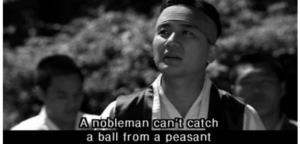
Kim’s YMCA Baseball Team presents a multifaceted narrative of Korea’s colonial history and its relationship with Japan while addressing the complex transitions taking place within Korean society. This film would be appropriate for high school and college history or culture courses as well as film classes. Although YMCA Baseball Team is not a documentary, the historical, social, and political context of the film can serve as a point of departure for further exploration and discussion. The visual re-creations of the streets of Seoul in the early 1900s match the documentary photographs available in photo-history books such as Seoul Through Pictures (both volumes), that instructors can use to supplement the film.1 Instructors can introduce the complicated concepts of nationalism and colonialism through a more accessible topic such as baseball by linking the important ways in which international sports competitions can function in international relations and history.
*Some DVD versions of YMCA Baseball Team say they contain English subtitles when they actually do not. The most reliable online source for this video is Seoulselection at http://www.seoulselection.com/.
NOTES
1. The City History Compilation Committee of Seoul, Seoul Through Pictures 1: The Modernization of Seoul and its Trials (1876–1910) (Seoul: The City History Compilation Committee of Seoul, 2002), and The City History Compilation Committee of Seoul, Seoul Through Pictures 2: Seoul under Japanese Aggression (1910–1945) (Seoul: The City History Compilation Committee of Seoul, 2002), (English). These volumes are available for purchase online at Seoulselection (http://www.seoulelection.com/).

